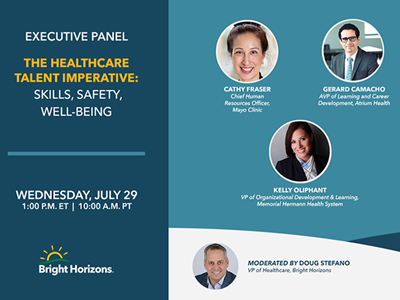Early on during the pandemic, when employers across industries were assessing the most effective way to use budgets, researchers at McKinsey cautioned organizations against taking their eye off skill building.
“Managers,” they wrote, “can’t push the pause button on capability building.”
That’s been doubly important for healthcare. There’s no question the pandemic has challenged every industry to keep up. But in healthcare – where the human element is everything – committed, agile teams who can adapt aren’t just one driver of effective responses; they’re the only driver.
Many healthcare organizations wisely took that to heart, not only declining to slow their development programs, but actually ramping them up. These employers view education as an investment in their future, and took active steps to ensure people could both find and use their programs. And they’re telling success stories as a result.
What these organizations have done:
They’ve continued to find ways to make their programs accessible. It would be easy to look at the difficulties of the moment -- the impractical nature of advising prospective students during a lockdown -- as a reason to hit pause. But one of our healthcare clients did just the opposite, going all in on virtual education fairs that gave people the tools to consider new programs right now. The results speak for themselves, with hundreds of employees registering for these sessions every week.
They’ve looked for ways to address financial concerns. The biggest barrier to any program is cost – not just paying; but waiting to be reimbursed. Financial insecurity makes people even less likely to spend now. A simple change at one hospital – paying schools directly so employees don’t have to come up with any cash – removed a giant obstacle, generating a 10% uptick in new students in a very short time.
They’ve shown employees clear futures. Another healthcare employer we work with celebrated more than 160 new graduates – just since the start of the pandemic. It’s no surprise when you look into how many of those new credentials will be useful in advancing careers at the hospital. The answer: all of them.
The other thing to know about the above success stories is that they build more skills. New graduates coming out of these programs aren’t just highly skilled employees – they’re testimonials showing opportunities for junior people looking to advance, and those coming in from outside. As we emerge from the moment, that constant flow – and the illustration of successful advancement -- will become your pipeline that moves veteran staff up and new people in.
And there are more than future skills at stake. Even for providers who’ve been ably managing so far, there’s the big question of how to maintain that momentum in the highly stressful here and now. Research shows over and over that the very opportunity to develop careers offers rewards in committed, creative, adaptable people.
It means well-thought out development programs are one way to effectively position organizations for both today and for what comes next.
Executive Panel: The Healthcare Talent Imperative
Hear insights from healthcare HR executives on how they are approaching this deeply challenging moment, and what they see ahead.






